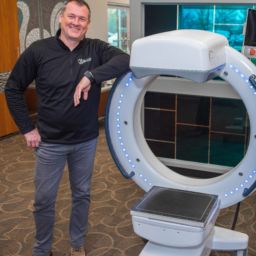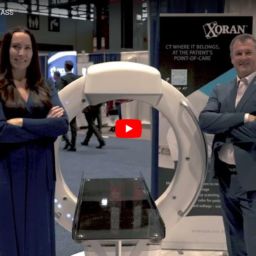
ANN ARBOR, MI, November 12, 2021–Xoran Technologies was recently notified of a grant award from the National Heart, Lung, and Blood Institute (NHLBI) of the National Institutes of Health (NIH) to support the company’s research and development efforts for lung computed tomography (CT) imaging.
Leveraging its knowledge and experience in the field as the pioneer and medical market leader in cone beam CT, Xoran has proposed TRON—an open-bore, truly mobile CT to assist in the identification of lung disease. In addition, Xoran has established collaborative partnerships with specialists in Pulmonary and Critical Care Medicine and Radiology at the University of Michigan, Ann Arbor.
“We are grateful to NHLBI for giving us an opportunity to bring this new application to life,” states William van Kampen, Xoran’s Chief Technology Officer and principal investigator on the research project. “We are excited to be working with the U-M team on a device that will allow point-of-care imaging of the lungs for helping patients who otherwise might have no good imaging option.”
With the xCAT IQ—an FDA 510k-cleared mobile CT system for bone and brain imaging, Xoran has shown capability in point-of-care (POC) CT solutions for the intensive care unit (ICU) and the operating room. This new TRON project allows Xoran to optimize a POC specifically for thoracic imaging for a variety of needs. The combined Xoran and U-M teams aim to develop a highly deployable CT scanner intended for use in the ICU, especially for patients with acute respiratory failure requiring mechanical ventilation, among other uses.
“It’s hard to overstate how transformative this technology would be for us in the ICU,” says Robert Dickson, MD, Associate Professor in Pulmonary & Critical Care Medicine, Deputy Director of the Weil Institute for Critical Care Research & Innovation, and a clinical collaborator at the University of Michigan. “Every day, we make clinical decisions based on chest X-rays, which are limited in what they can tell us about what is going on in the chest or abdomen. Our patients are often too sick to transport down to radiology, or they have a communicable disease like COVID-19 that we don’t want to spread around the hospital. A bedside scanner would have an immediate impact on how we manage our sickest patients.”
That’s not everything that Xoran aims to achieve with this grant project and the future TRON device.
“The TRON could help with rapid deployment for diagnostics in similar respiratory pandemic situations in the future. Really, it’s not just about the mobility; TRON will be easy-to use-and accessible,” explains Misha Rakic, Xoran’s Chief Executive Officer. “The goal is to offer a point-of-care CT device that is widely available and affordable to support diagnosis, triaging, and monitoring of respiratory and other patients who are too risky to move to centralized radiology. This paradigm could easily be applied to other modalities, and we can potentially provide a ‘one-stop shop’ POC solution for any CT and X-ray imaging need in the future.”
Xoran has a successful track record of receiving awards for commercializing SBIR technologies, such as the MiniCATTM CT scanner and a future device for spine CT imaging with integrated surgical navigation. Today, Xoran is an innovator and medical market leader with over 1,000 installations globally.
###
About the National Institutes of Health
Research reported in this news release was supported by the NHLBI of NIH under Award Number 1R44HL158452-01. The content is solely the responsibility of the authors and does not necessarily represent the official views of the National Institutes of Health.
About National Heart, Lung and Blood Institute (NHLBI)
NHLBI is the global leader in conducting and supporting research in heart, lung, and blood diseases and sleep disorders that advances scientific knowledge, improves public health, and saves lives.
About Weil Institute for Critical Care Research & Innovation
The team at the Weil Institute for Critical Care Research & Innovation is dedicated to pushing the leading edge of research to develop new technologies and novel therapies for the most critically ill and injured patients. Through a unique formula of innovation, integration, and entrepreneurship, their multi-disciplinary teams of health providers, basic scientists, engineers, and data scientists, commercialization coaches, donors and industry partners are taking a boundless approach on re-imagining every aspect of critical care medicine. For more information, visit Weil Institute.
About the University of Michigan
The University of Michigan was founded in 1817 and is a state-supported institution with a national and international reputation for excellence in scholarship. The Ann Arbor campus enrolls more than 43,000 students annually, including over 15,000 graduate students. The Michigan Center for Integrative Research in Critical Care is a collaborative center within the University of Michigan dedicated to improving the care of patients with critical illness by uniting the diverse expertise of faculty from across the institution.
About Xoran Technologies
Since 2001, Xoran is the pioneer and medical market leader in low-dose radiation, cone beam CT systems specifically designed for the patient’s point-of-care. Providers around the world rely on our industry leading MiniCAT™, xCAT™, and veterinary CT systems: VetCAT and vTRON, to diagnose and treat patients.
Xoran is based in Ann Arbor, Michigan.
For more information visit www.xorantech.com/
© 2021 Xoran Technologies, LLC
Media Contact
Aramide Boatswain
+1.734-709-0464
info@xorantech.com






